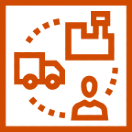What is Bitcoin Blockchain Technology?
What is the Bitcoin Blockchain?
The blockchain is a distributed, public ledger that contains the history of every bitcoin transaction. Anyone can download a copy of the blockchain, and it can be inspected to trace the path of bitcoins from one bitcoin transaction to another. It should be noted that while there is a record of every bitcoin transaction ever made, these transactions are not inherently linked to real life identities. For this reason, Bitcoin is considered pseudonymous.
Bitcoins themselves are not files stored on your computer's hard drive like MP3s or PDFs. Rather "owning bitcoins", means owning a bitcoin address, which has a balance recorded on the blockchain. What it means to own a bitcoin address is to control the associated Private Key, and therefore allow the signing of transactions.
What is a Block?
A Block refers to a set of Bitcoin transactions from a certain time period. Blocks are "stacked" on top of each other in such a way that one block depends on the previous. In this manner, a chain of blocks is created, and thus we come to the term "blockchain".
What is Bitcoin Blockchain Technology?
A blockchain is a decentralized ledger of all transactions across a peer-to-peer network. Using this technology, participants can confirm transactions without a need for a central clearing authority. Potential applications can include enterprise blockchain applications, sustainability, tokenization, fund transfers, supply chain tracking and many other areas.
What is cryptocurrency?
Cryptocurrency is a medium of exchange, created and stored electronically on the blockchain, using cryptographic techniques to verify the transfer of funds and an algorithm to control the creation of monetary units. Bitcoin is the best known example.
- Has no intrinsic value in that it is not redeemable for another commodity, such as gold.
- Has no physical form and exists only in the network.
- Its supply is determined by the protocol, not a central bank and the network is completely decentralized.

Blockchain’s benefits and unknowns
Benefits
- Increased transparency
- Accurate tracking
- Permanent ledger
- Cost reduction
Unknowns
- Complex technology
- Regulatory implication
- Implementation challenges
- Competing platforms

Blockchain’s potential applications

Supply chain
Visibility through the entire supply chain tracking individual components through the final product.
Travel
Corporations reducing costs by eliminating intermediaries and working directly with the airlines to track travel for each employee.
Sustainability
Improved management of resources by collecting decentralized data and distributing it to system participants.

Financial inclusion
Access to capital that was previously unavailable for the average consumer; funding projects that can power the future economy.
Blockchain also has potential applications beyond digital assets, such as bitcoin and cryptocurrency
From a business perspective, it’s helpful to think of blockchain technology as a type of next-generation business process improvement software. Collaborative technology, such as blockchain, proclaims the ability to improve the business processes that occur between companies, radically lowering the “cost of trust.” For this reason, it may offer significantly higher returns for each investment dollar spent than most traditional internal investments.
For an overview of digital assets, which include cryptocurrencies, start with Demystifying cryptocurrency and digital assets. We provide an introduction into the mechanics of the digital asset world, how it functions, the various categories of assets, and where the future of this space could lead.
For a deeper understanding of digital assets, we recommend these resources.
- Digital Assets and Crypto: PwC’s open source of knowledge on all things crypto.
- PwC 2023 Digital Asset Predictions provides our thoughts on where the industry is heading to help business leaders craft the strategy that this promising but volatile space requires — one that matches innovation with trust.
- What’s next for these five crypto and NFT trends in 2023?
- Why is crypto custody important for financial institutions? A discussion on how custody is the foundation for any business venture into digital assets.
For an overview into web3, we recommend Demystifying web3 which discusses what business leaders should know about web3, its potential, and what no regrets decisions you can make to prepare. Here are two more recommendations.
- Five ways to deepen customer engagement and loyalty with web3 which discusses how loyalty programs can be improved using web3 technology.
- How to build a sustainable NFT strategy discusses how an NFT strategy can drive revenue and growth by building a foundation for the future.
For a deeper understanding of blockchain technology, we suggest Embracing sustainable innovation: understanding the environmental impacts of blockchain technology, which discusses in detail how blockchain technology can be used to improve sustainability strategies.
For a look into our historical thinking in this space, we recommend:
- Money is no object explores the early days of bitcoin and provides survey data on consumer familiarity, usage and more. We also look at how market participants — such as investors, technology providers and financial institutions — will be affected as the market matures.
- A strategist’s guide to blockchain examines the potential benefits of this important innovation and suggests a way forward for financial institutions. Explore how others might try to disrupt your business with blockchain technology and how your company could use it to leap ahead instead.
- Building blocks: How financial services can create trust in blockchain discusses some of the issues internal audit and other parties may have with a blockchain solution and how you can start to overcome some of those concerns.
Although blockchain announcements are less frequent and happen with less fanfare than they did a few years ago, blockchain technology has the potential to result in a radically different competitive future.



Comments
Post a Comment